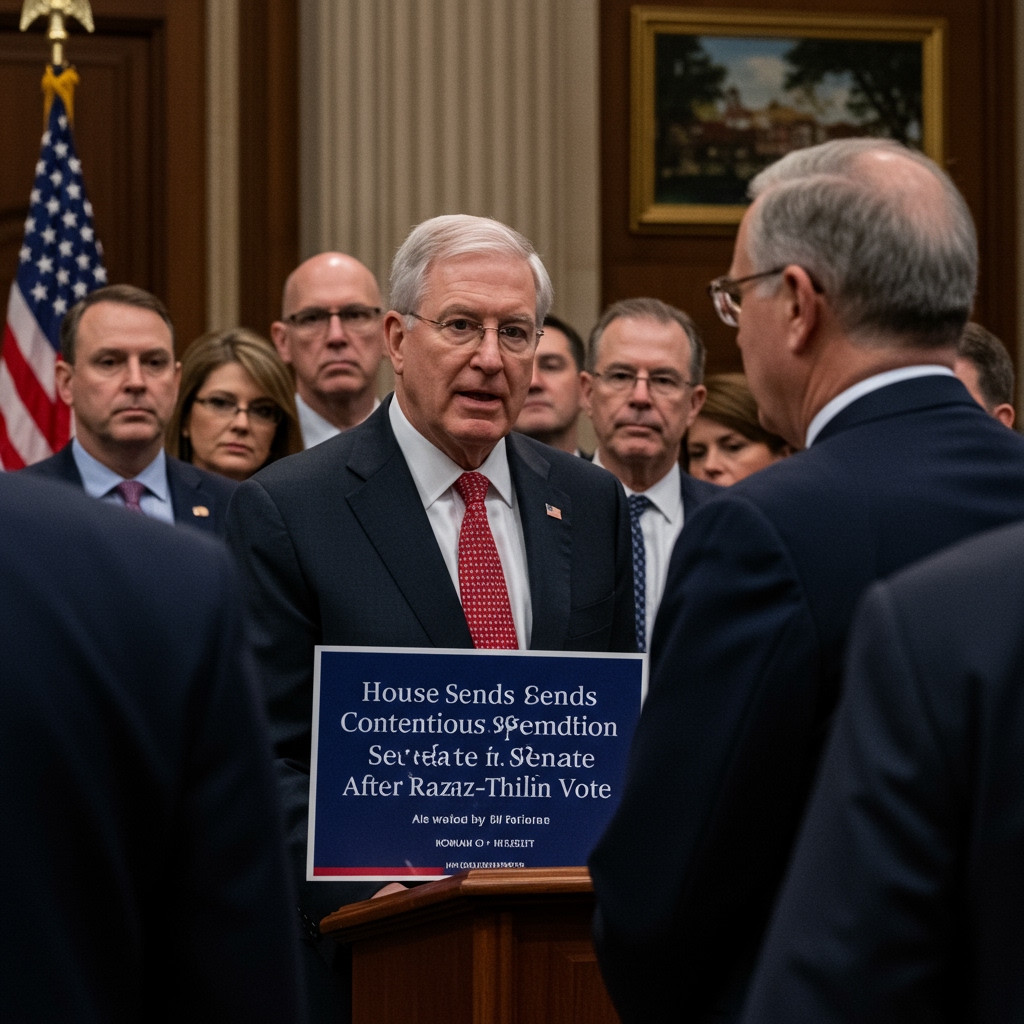US House Passes Major Appropriations Bill Amid Sharp Division
Washington, D.C. – In a move that highlights deep partisan divides within the U.S. Congress, the House of Representatives today narrowly approved H.R. 7890, a sweeping appropriations bill that sets spending levels for numerous federal agencies and programs for the coming fiscal year. The legislation, considered a significant legislative victory by its proponents and a potentially damaging measure by its critics, passed by a vote of 220 in favor to 215 against. This tight margin underscores the contentious nature of the bill and the significant opposition it faced during debate on the House floor.
The vote fell largely along party lines, a common occurrence in the current political climate but one that nonetheless signals the difficulty this bill may encounter as it moves through the legislative process. Analysis of the vote tally shows minimal cross-party support, with only a handful of representatives from the minority party crossing the aisle to vote with the majority. Conversely, a small number of majority party members also voted against the measure, reflecting localized concerns or specific disagreements with certain provisions within the extensive bill.
Contentious Provisions Spark Debate
The substance of H.R. 7890 has been the primary driver of the controversy surrounding its passage. The bill proposes substantial cuts to various domestic programs, a key demand from the majority party caucus focused on fiscal conservatism and reducing the national debt. Among the areas targeted for significant reductions are environmental protection initiatives and social services programs. Advocates for these programs have voiced strong opposition, arguing that such cuts would harm vulnerable populations, impede critical conservation efforts, and undermine public health and safety.
Specifically, funding allocations for agencies responsible for environmental regulation, climate research, and pollution control saw notable decreases in the bill as passed by the House. Similarly, programs providing support for housing assistance, food security, education grants, and healthcare services faced rollbacks in funding. Opponents argue these cuts represent a disproportionate burden on low-income families and marginalized communities, asserting that they contradict the federal government’s role in providing a safety net and investing in societal well-being.
Conversely, H.R. 7890 allocates increased funds towards defense initiatives. Proponents of the bill argue that this boost in military spending is necessary to address evolving national security threats, maintain technological superiority, and support the nation’s armed forces. They contend that in a complex global landscape, prioritizing defense spending is paramount to protecting U.S. interests and ensuring the safety of its citizens. This increase in defense spending, paired with the cuts to domestic programs, creates a stark contrast in funding priorities, which has been a central point of contention between the two major parties.
Political Dynamics and the Path Forward
The passage of H.R. 7890 through the House was the culmination of weeks of intense negotiation, procedural maneuvers, and heated debate. The majority party leadership worked diligently to rally their members, making the passage of this appropriations package a key legislative goal. The narrow victory margin, however, suggests the fragility of the coalition needed to pass significant legislation and the potential for similar challenges in the future.
The bill now proceeds to the Senate, where its fate remains highly uncertain. The political landscape in the Senate differs from that in the House, and the procedural rules often require broader bipartisan consensus to advance legislation, particularly significant spending bills. Strong opposition from the minority party in the Senate is anticipated, mirroring the divisions seen in the House. Minority party leaders have already signaled their intent to challenge key provisions of H.R. 7890, particularly the deep cuts to domestic programs.
Potential outcomes in the Senate range from the bill being significantly amended, stalled indefinitely, or failing to pass altogether. Senators from both parties are expected to engage in rigorous debate and potential negotiations. The bill could be used as leverage in broader budget discussions or tied to other legislative priorities. The stark differences in funding priorities between the House-passed bill and the likely preferences in the Senate suggest that a protracted legislative battle is probable.
Implications and Outlook
The passage of H.R. 7890 by the House marks a critical step in the annual appropriations process, but it is far from the final word on federal spending for the upcoming fiscal year. The significant proposed cuts to environmental protection and social services, coupled with the increase in defense funding, represent a clear statement of priorities from the House majority. However, the substantial opposition and the uncertain path through the Senate mean that the final shape of the federal budget is still very much in flux.
Advocacy groups representing environmental interests and social service providers have vowed to increase pressure on senators to oppose the bill as currently written. Conversely, defense industry advocates and proponents of fiscal restraint are expected to lobby for its passage. The coming weeks will be crucial as the Senate takes up the measure, and negotiations, potentially involving leadership from both chambers and the executive branch, will likely be necessary to reach a compromise that can ultimately become law.
The 220-215 vote in the House on H.R. 7890 serves as a powerful indicator of the current political climate and the challenges inherent in governing with narrow majorities. The journey of this contentious spending bill through Congress will be a key storyline to watch, with significant implications for federal agencies, programs, and the millions of Americans who rely on them.





